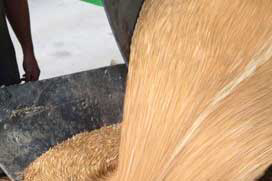UK: Record wheat yields thanks to perfect weather

The NFU harvest survey, published on Tuesday (7 October), predicted that the 2014 UK wheat harvest would weigh in at 8.6t/ha – the biggest ever uplift in 30 years and 16% more than 2013.
A perfect summer for growing conditions contrasted with the wettest winter and third warmest spring on record earlier this year, created favourable conditions for disease in crops.
However, disease was kept at bay with careful management and the appropriate use of available crop protection products, which ensured not only healthy thriving plants but a high-quality yield.
NFU combinable crops board chairman Mike Hambly said: “This year’s wheat harvest shows how dependent crop yield is on the weather and, as extreme weather events become more frequent, how we as farmers can cope with this.
“Unfortunately, we are at the mercy of the weather but fungicides and insecticides are essential tools allowing us to protect our crops in adverse weather.
“Many of these are under threat from EU Commission regulation and as this legislation hits, in turn, will compromise both the quality and potential yield of wheat.
“If farmers are going to rise to the challenge of producing food amidst climate change and the weather volatility that comes with it, then we need to be allowed to use the most effective active ingredients for the job. Research needs government interest and investment so we can grow crops resilient to all weather conditions.”
The NFU is lobbying the EU Commission on plans for tighter restrictions on the use of agrochemicals to be reviewed to allow for more harvests like this year.
It is concerned that further regulation from the commission will remove and restrict vital active ingredients in crop protection products, such as the ban on the use of neonicotinoids last December for use on flowering crops such as oilseed rape, barley and sunflowers.
Mr Hambly added: “Farmers have an important job to do, we need the right regulation in place and access to appropriate chemistry to ensure we can all enjoy and benefit from an abundant and healthy harvest, such as we have had this year.
“Optimising our productivity allows us to impact less on the environment and meet our responsibilities to the growing global demand for food.”
However, not every farmer enjoyed a bumper harvest this year. Scottish grower Iain Green told Farmers Weekly last week his farm had suffered the worst harvest in living memory.
However, NFU vice president Guy Smith said low prices would take the shine off good harvest yields.
“Arable farmers will have very mixed emotions following the 2014 Harvest,” he said. “We were buoyed by good yields and full barns but depressed by poor market prices.
“Most farmers will have not sold forward so even with record yields of 8.75t/ha, when you multiply that by the selling price of £105 then subtract £750 in growing costs, that doesn’t leave a lot of margin to cover rent, finance and private drawings.”
He added: “The irony is many of us will be worse off than we were following the harvest ‘disaster’ of 2012 when wheat was worth £200/t.”











